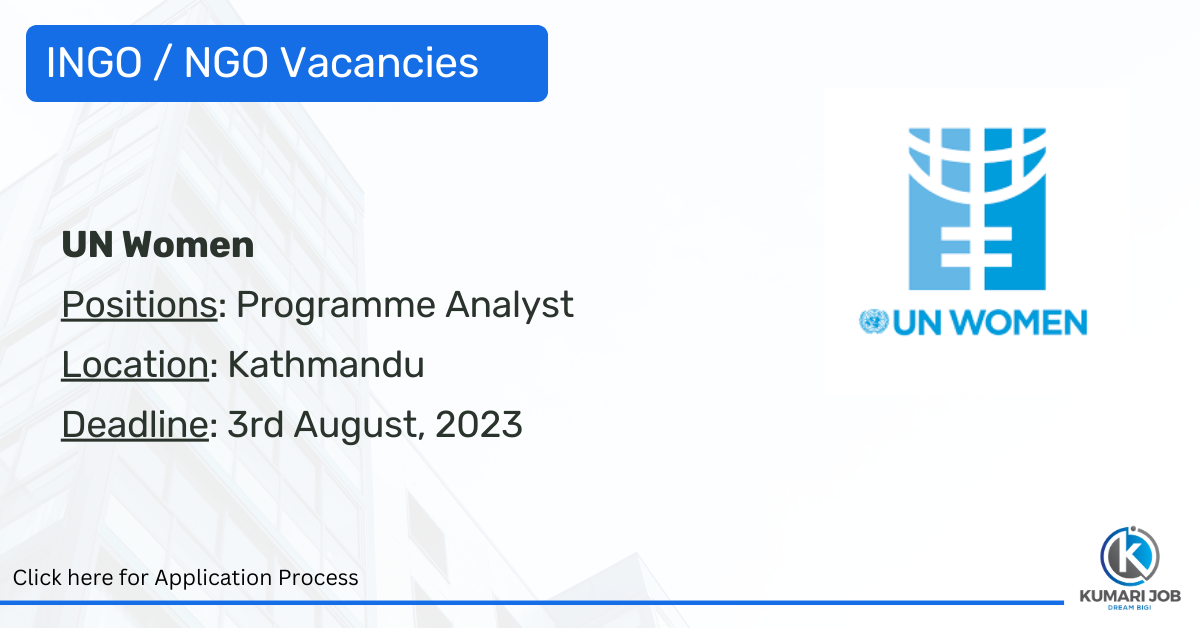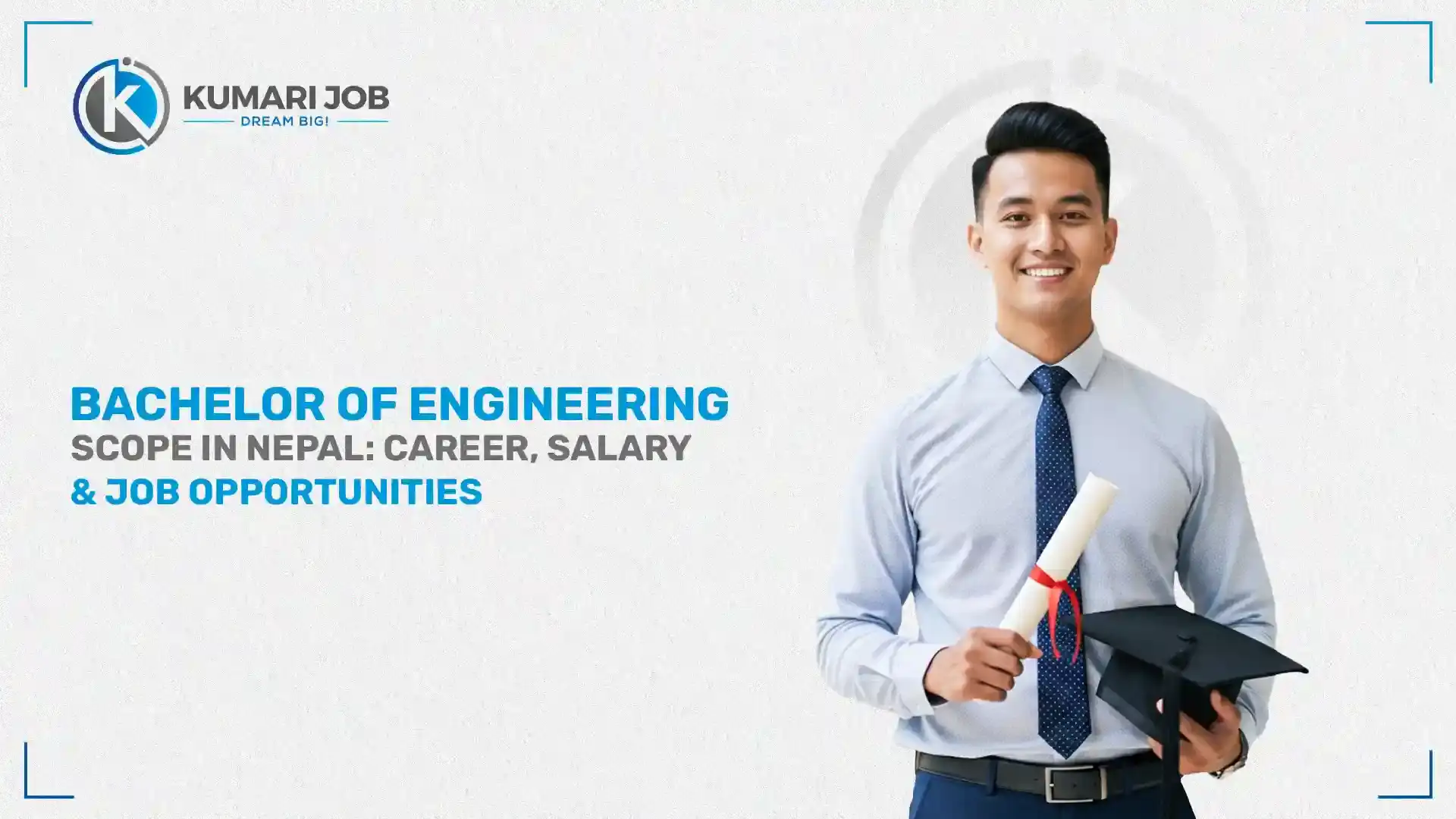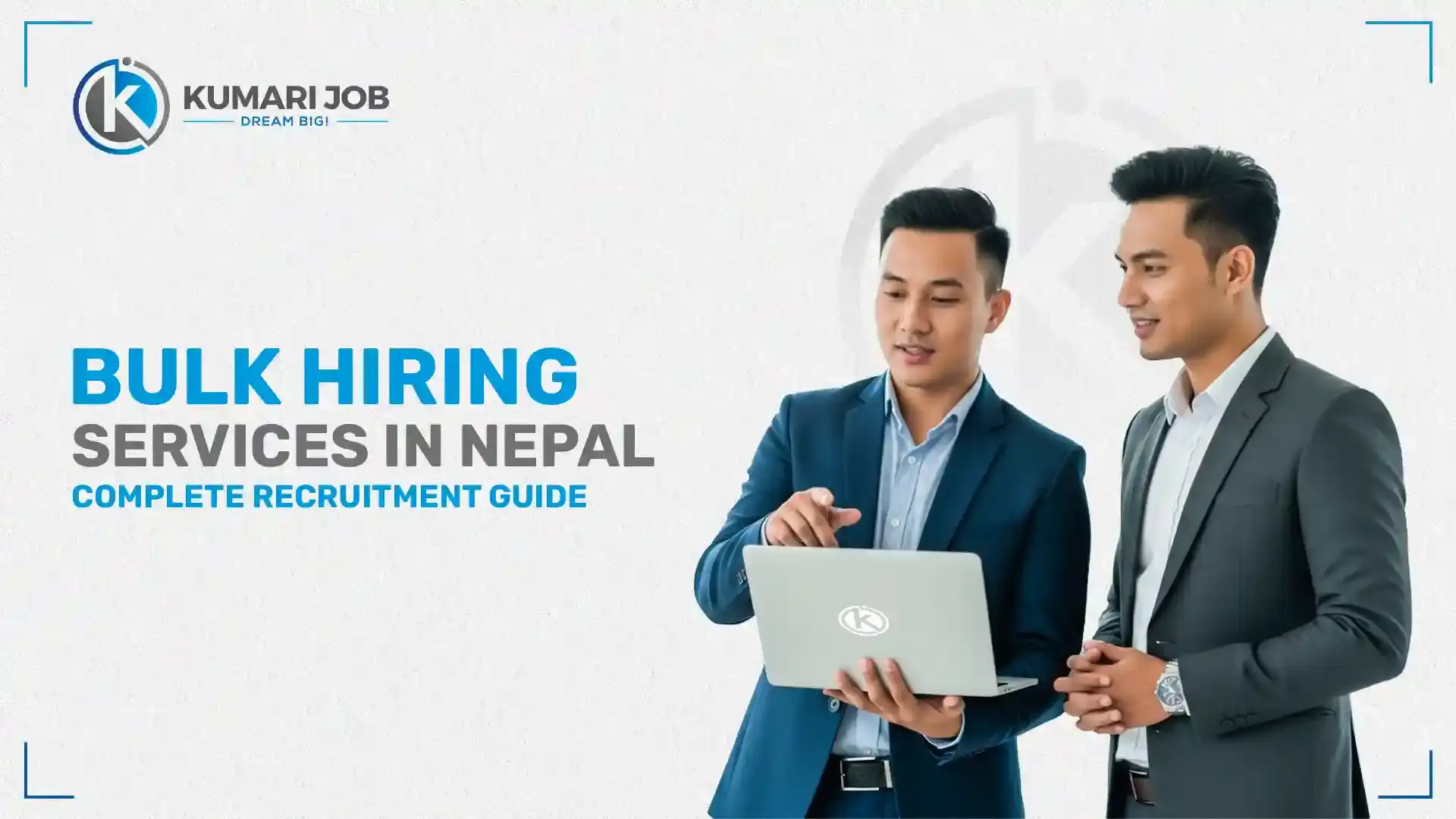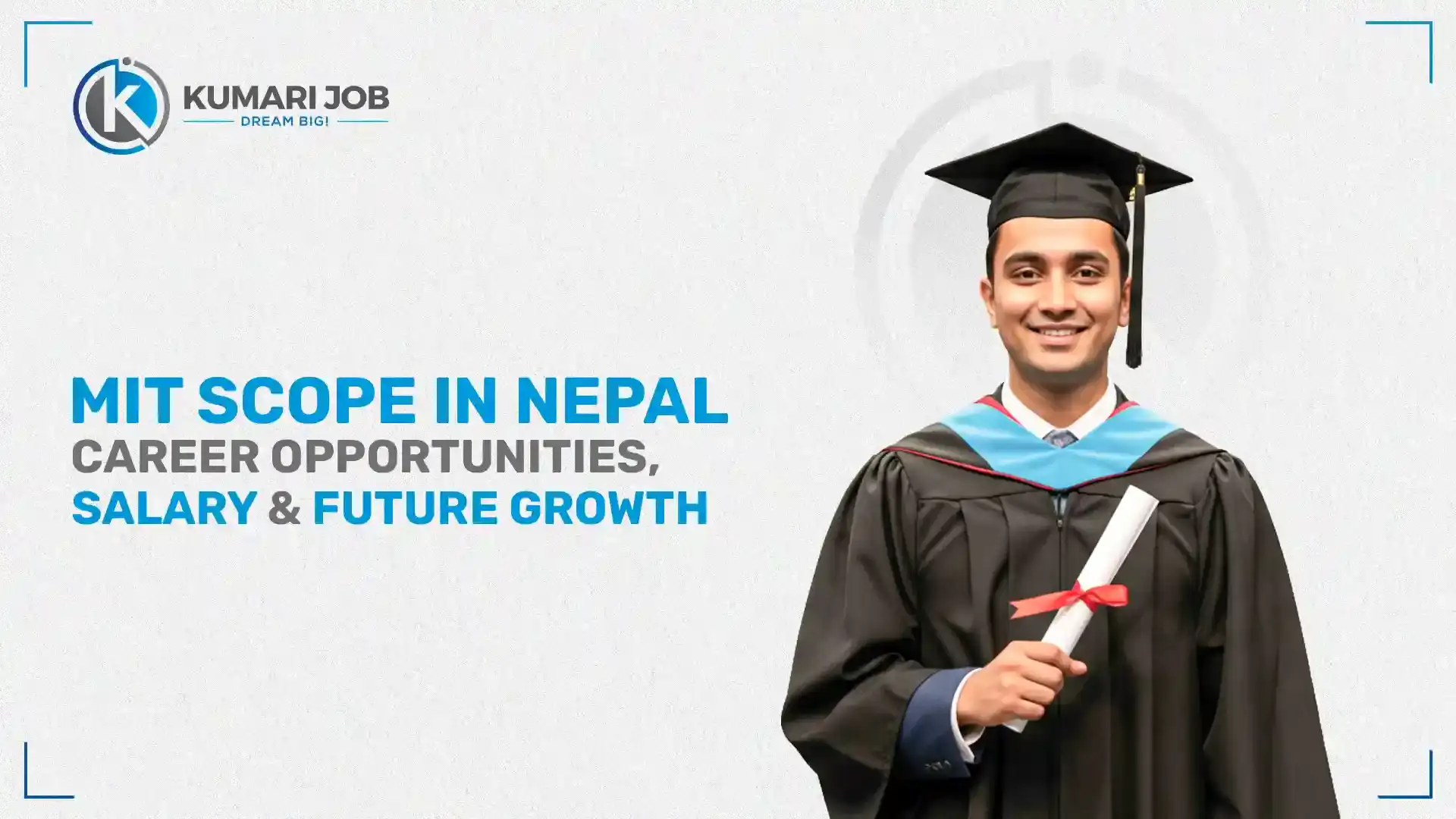
If you are passionate about advancing gender equality and women’s empowerment, this is a great opportunity for you. UN Women Nepal has announced a vacancy for the position of Programme Analyst, inviting qualified professionals to contribute to impactful programs that support women’s rights and development. If you have strong analytical skills and a commitment to social change, this role could be the perfect fit to help you make a meaningful difference in Nepal.
In this blog
Programme Analyst
Location: Kathmandu, NEPAL
Application Deadline: 03-Aug-23 (Midnight New York, USA)
Additional Category: Management
Type of Contract: FTA Local
Post Level: NO-B
Languages Required: English
Starting Date: (date when the selected candidate is expected to start) 02-Oct-2023
UNDP is committed to achieving workforce diversity in terms of gender, nationality and culture. Individuals from minority groups, indigenous groups and persons with disabilities are equally encouraged to apply. All applications will be treated with the strictest confidence.
UNDP does not tolerate sexual exploitation and abuse, any kind of harassment, including sexual harassment, and discrimination. All selected candidates will, therefore, undergo rigorous reference and background checks.
Background
UN Women, grounded in the vision of equality enshrined in the Charter of the United Nations, works for the elimination of discrimination against women and girls; the empowerment of women; and the achievement of equality between women and men as partners and beneficiaries of development, human rights, humanitarian action and peace and security.
UN Women in partnership with sister agencies FAO, WFP and IFAD and under the leadership of the Ministry of Agriculture and Livestock Development (MoALD) has successfully concluded the first phase of the Joint Programme “Accelerating Progress towards Rural Women’s Economic Empowerment (JP RWEE)” in September 2021. The programme was implemented in the Rautahat and Sarlahi districts of Madhesh Pradesh.
The JP RWEE Phase II was implemented in December 2022 in the Siraha and Saptari districts of Madhesh Pradesh. For this purpose, the position of Programme Analyst/National Coordinator has been announced. The National Coordinator is responsible for the overall management and coordination of the Joint Programme in Nepal. The Joint Programme is a five-year programme (2022-2027) implemented through a partnership between FAO, IFAD, UN Women and WFP, led by UN Women in Nepal. The programme generates synergies that capitalize on each Agency’s mandate, comparative advantages and institutional strengths to generate lasting and large-scale improvements in the lives of rural women. The programme aims to secure the livelihoods, rights and resilience of rural women in the context of sustainable development and Agenda 2030 and focuses on four key outcomes for rural women: (1) improved food security and nutrition; (2) increased incomes to sustain livelihoods and build resilience; (3) increased voice and agency for full leadership and participation in rural communities and governance structures, and (4) more gender-responsive policy environment for the economic empowerment of rural women.
The joint programme in Nepal is part of the global JP RWEE initiative, currently being implemented in six countries worldwide through the Multi-Partner Trust Fund modality. The implementation of the JP in Nepal is managed through the lead agency, UN Women and overseen by a national-level Programme Steering Committee, consisting of senior representatives of the four participating agencies and government representatives. Implementation of the programme is monitored and supported by a Technical Working Group, consisting of technical focal points of each of the four agencies. A Programme Management Unit, situated within the lead agency, consisting of a National Coordinator and a Monitoring Evaluation, Accountability and Learning (MEAL) Coordinator oversees the management and implementation of the programme. The Programme Analyst/National Coordinator leads, coordinates and oversees the implementation of the programme and collaborates closely with JP RWEE stakeholders.
The Programme Analyst/National Coordinator reports to the Programme Specialist in the lead agency UN Women and will also have accountability to the JP RWEE Global Coordinator, based in WFP’s headquarters in Rome. He/she/they will be expected to assume the responsibilities listed below.
Duties and Responsibilities
The Programme Analyst/National Coordinator is responsible for the overall coordination, management and implementation of the Joint Programme and for liaising with key stakeholders. She/he/they will work in close collaboration with the technical focal points of the four participating agencies to ensure smooth programme implementation and will liaise with senior participating agency staff and government representatives with regard to the governance of the programme. He/she/they will play a critical role in ensuring that synergies are built and that strong coordination and communication between participating agencies, implementing partners, and government is in place. She/he/they will represent the Joint Programme with government and external stakeholders and ensure strong visibility of the programme. She/he/they will also participate in coordination processes organized by the Global Coordination Unit and in global-level learning forums in order to enable cross-fertilization and the sharing of good practices on a wider scale. The Programme Analyst/National Coordinator represents the JP RWEE in the country. He/she/they is based within the lead agency and collaborates closely with the four participating agencies. Specific responsibilities include the following
Coordination
- Lead the coordination mechanisms of the JP RWEE, serving as the overall manager of the programme for internal (participating organisations) and external partners (implementing partners, government and other stakeholders);
- Organize and lead monthly meetings with the Technical Working Group;
- Organize the annual national-level Programme Steering Committee meeting and other meetings with government representatives and JP RWEE stakeholders as needed;
- Organize and lead a coordination platform between the participating agencies, implementing partners and other local stakeholders including local government on a bi-annual basis and as needed;
- Lead the organization of multi-stakeholder forums and/or events;
- Liaise with and provide updates to senior management (including for the RCO) and government representatives as required;
- Provide regular updates and respond in a timely manner to requests for information by the Global Coordination Unit;
- Attend National Coordinator meetings organised by the Global Coordination Unit;
Programme Management and Implementation
- Oversee the implementation of the programme in line with the approved proposal document and the annual work plan, ensuring that activities are implemented on time and within the approved programme scope;
- Ensure that systems for programme planning, implementation and monitoring are in place;
- Oversee the development of the annual work plan and budget, including review and provision of feedback to the four participating agencies and submit the work plan to the
- Global Coordinator, ensuring adherence to requirements;
- With the technical working group, address any challenges to implementation and identify solutions in a timely manner;
- Organise and lead joint field visits to the programme between the participating agencies, and field visits with government representatives as appropriate;
- Ensure that programme expenditure occurs as per the approved work plan and respond to any overspends/underspends in a timely manner and in line with operational procedures for the Fund;
- Ensure that programme performance indicators and milestones established by the Global Coordination Unit are met, and put in place improvement measures as needed;
- Encourage programme innovation and ensure agencies maximise their relevant technical expertise.
Monitoring and Reporting
- Ensure the implementation of the M&E system, in line with the approved M&E plan (led by the MEAL Coordinator);
- Lead quarterly review processes with participating agencies and implementing partners and in close collaboration with the MEAL Coordinator;
- Lead annual review workshops with JP RWEE stakeholders;
- Ensure that a complaints response mechanism is in place for the programme;
- Oversee the implementation of the mid-term review, endline survey, and final evaluation (led by the MEAL Coordinator);
- Ensure the accurate and timely submission of agency reports;
- Review and provide feedback on agency reports;
- Prepare country annual and bi-annual reports for donors, collating reporting information from the agencies, drafting reports and submitting the reports to the Global Coordination
- Unit to the quality and standard required;
Knowledge Management and Learning
- Oversee the development and implementation of a knowledge management plan for the programme;
- Ensure that a culture of learning is developed across the programme and that wider agency take-up of programme methodologies is encouraged;
- Organise and lead experience sharing, including with participating agencies, implementing partners and beneficiaries;
- Identify good practices and lessons learned from the programme implementation, and document this knowledge for wider replication and use;
- Ensure the regular use of the programme’s globally managed knowledge management by the participating agencies, and make contributions to the platform as appropriate;
- Participate in learning and knowledge management processes organised by the Global Coordination Unit and contribute to cross-fertilisation and South-South learning within the wider global programme.
Communications
- With the support of the Global Coordination Unit, develop a simple communications plan and ensure its implementation;
- Contribute to the development of communication products that promote programme visibility.
HR/Administration
- Supervise the JP RWEE MEAL Coordinator, including carrying out performance appraisal;
- Identify opportunities for capacity building of partners and facilitate technical/ programming support and training to partners, as needed, particularly in relation to gender equality;
- Liaise with the Global Coordinator regarding issues relating to Fund requirements;
- Ensure the efficient signing of programme documents and submission of funds transfer requests;
- Ensure that the participating UN organisations and government stakeholders are familiar with the relevant ToRs for the programme’s governance and coordination mechanisms.
Other
- Undertake any other duties as requested.
Key performance indicators:
- Timely and quality substantive inputs programme strategies and activities;
- Timely and quality substantive inputs to work plans and budgets;
- Timely and quality technical inputs to the programme team and partners in line with the work plan;
- Timely monitoring and tracking of programme results and finances;
- Timely submission of quality and accurate reports;
- Quality support to evaluation processes, including timely coordination of mission;
- Quality of inputs to advocacy, knowledge building and communication efforts;
- Relationship with partners and stakeholders;
- Timely organization of events;
- Adherence to UN Women standards and rules.
Competencies
Core Values
- Respect for Diversity;
- Integrity;
- Professionalism.
Core Competencies
- Awareness and Sensitivity Regarding Gender Issues;
- Accountability;
- Creative Problem Solving;
- Effective Communication;
- Inclusive Collaboration;
- Stakeholder Engagement;
- Leading by Example.
Please visit this link for more information on UN Women’s Core Values and Competencies: https://www.unwomen.org/sites/default/files/Headquarters/Attachments/Sections/About%20Us/Employment/UN-Women-values-and-competencies-framework-en.pdf
Functional Competencies
- Good knowledge of programme formulation and implementation and Results Based Management;
- Good knowledge of monitoring and evaluation, evaluation design, data collection and analysis, and reporting;
- Ability to synthesize program performance data and produce analytical reports;
- Ability to gather and interpret data, reach logical conclusions and present findings and recommendations;
- Good knowledge of gender equality and women’s economic empowerment;
Ability to identify and analyze trends, opportunities and threats to fundraising.
Required Skills and Experience
Education and Certification
- Master’s degree (or equivalent) in Social Science, International Development Studies, Gender/Women’s Studies or a related field is required.
Experience
- At least 2 years of progressively responsible experience in women’s economic empowerment programming and gender equality is essential
- At least 5 years of experience in development programme/projects implementation, coordination, monitoring and evaluation, donor reporting and capacity building;
- Experience in women human rights, gender equality and women’s economic empowerment
- Experience in the United Nations systems in an asset;
- Experience of multi-stakeholder partnership
- Field experience is an asset.
Other Requirements
- Ability to work independently in a timely and organized manner;
- Ability to multi-task and meet deadlines;
- Strong coordination skills;
- Excellent interpersonal and communication skills;
- Ability to develop strong working relationships with partners and stakeholders;
- Strong understanding of gender equality and women’s empowerment issues and concepts in relation to rural development and poverty alleviation;
- Familiarity with the sustainable development goals, including SDG5
Language Requirements
- Fluency in English and Nepali is required;
- Working proficiency in English is highly desirable and considered a strong asset.
- Knowledge of the other UN official working language is an asset;
Application Procedure (Kindly note that the system will only allow one attachment. Applications without complete documents will not be considered for further assessment). Only short-listed candidates will be contacted.
- Motivation letter
- UN Women Personal History form (P-11), which can be downloaded from https://www.unwomen.org/en/about-us/employment/application-process
No Fee:
THE UNITED NATIONS DOES NOT CHARGE A FEE AT ANY STAGE OF THE RECRUITMENT PROCESS (APPLICATION, INTERVIEW MEETING, PROCESSING, OR TRAINING). THE UNITED NATIONS DOES NOT CONCERN ITSELF WITH INFORMATION ON APPLICANTS’ BANK ACCOUNTS.
UN Women has a zero-tolerance against Sexual Exploitation and Abuse (SEA) and sexual harassment (SH). Everyone is responsible for preventing sexual exploitation and abuse (PSEA), and all UN personnel must adhere to the standards of conduct that preserve PSEA principles (both during work hours and outside work hours). All selected candidates will, therefore, go through a safe hiring process.
UN Women retain the right to contact referees directly. UN Women is committed to achieving workforce diversity (in term of gender, nationality, minority groups, caste/ethnic groups, Person with Disability etc.) and have a policy to have a gender balance among staff at all levels. Qualified female candidates and candidates particularly from disadvantaged and socially excluded groups are strongly encouraged to apply.
Request for Disability-related Reasonable Accommodations:
It is important for UN Women to create an accessible and inclusive workplace for everyone. Reasonable accommodation will be made to enable qualified individuals with disabilities to be recruited and to perform essential job functions. Should you require a reasonable accommodation in completing this application, interviewing, completing any pre-employment testing, or otherwise participating in the selection and recruitment process, please direct your request and inquiries to [email protected]. A member of the HR team responsible for reasonable accommodation will contact you to confidentially discuss your needs.
This email will only be used for any disability-related accessibility requests and not for sending the application itself.
All applications will be treated with the highest confidentiality.
To apply for this job please visit jobs.undp.org.
How to Get UN Women Jobs in Nepal
To get a job at UN Women Nepal, regularly monitor their official website and UN job portals for vacancies like the Programme Analyst position. Ensure your qualifications match the job requirements and tailor your CV and cover letter to highlight relevant skills and experience. Building expertise in gender equality, development programs, and strong analytical skills will improve your chances. Additionally, networking with professionals in the field and preparing well for interviews by understanding UN Women’s mission and projects can help you stand out.
Conclusion
A job at UN Women Nepal offers a meaningful career path dedicated to empowering women and promoting equality. By staying informed, preparing thoroughly, and showcasing your relevant skills, you can seize opportunities like the Programme Analyst role and contribute to important social change. Keep exploring trusted platforms for the latest jobs in Nepal and stay proactive in your career journey.











Loading Comments...